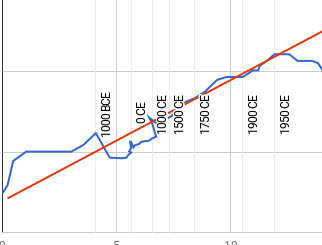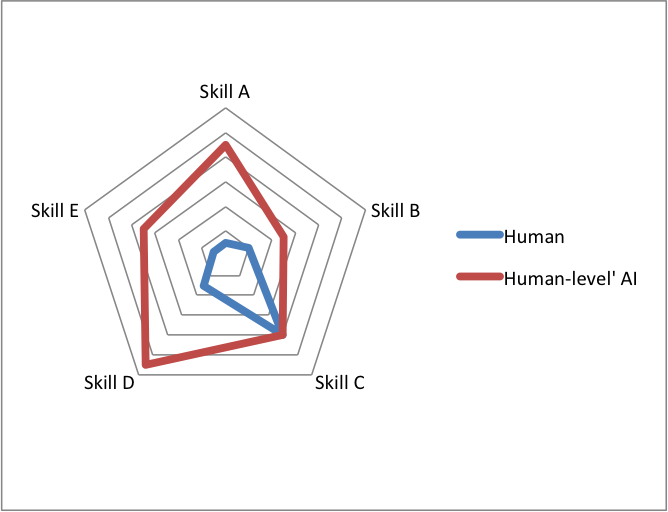Experts on AI probably systematically underestimate time to human-level AI, due to a selection bias. The same is more strongly true of AGI experts. The scale of such biases appears to be decades. Most public AI predictions are from AI and AGI researchers, so this bias is relevant to interpreting these predictions.
Details
Why we expect bias
We can model a person’s views on AI timelines as being influenced both by their knowledge of AI and other somewhat independent factors, such as their general optimism and their understanding of technological history. People who are initially more optimistic about progress in AI seem more likely to enter the field of AI than those who are less so. Thus we might expect experts in AI to be selected for being optimistic, for reasons independent of their expertise. Similarly, AI researchers presumably enter the subfield of AGI more if they are optimistic about human-level intelligence being feasible soon.
This means expert predictions should tend to be more optimistic than they would if they were made by random people who became well informed, and thus are probably overall too optimistic (setting aside any other biases we haven’t considered).
This reason to expect bias only applies to the extent that predictions are made based on personal judgments, rather than explicit procedures that can be verified to avoid such biases. However predictions in AI appear to be very dependent on such judgments. Thus we expect some bias toward earlier predictions from AI experts, and more so from AGI experts. How large such biases might be is unclear however.
Empirical evidence for bias
Analysis of the MIRI dataset supports a selection bias existing. Median people working in AGI are around two decades more optimistic than median AI researchers from outside AGI. Those in AI are more optimistic again than ‘others’, and futurists are slightly more optimistic than even AGI researchers, though these are less clear due to small and ambiguous samples. In sum, the groups do make different predictions in the directions that we would expect as a result of such bias.
However it is hard to exclude expertise as an explanation for these differences, so this does not strongly imply that there are biases. There could also be biases that are not caused by selection effects, such as wishful thinking, planning fallacy, or self-serving bias. There may also be other plausible explanations we haven’t considered.
Since there are several plausible reasons for the differences we see here, and few salient reasons to expect effects in the opposite direction (expertise could go either way), the size of the selection biases in question are probably at most as large as the gaps between the predictions of the groups. That is, roughly two decades between AI and AGI researchers, and another several decades between AI researchers and others. Part of this span should be a bias of the remaining group toward being too pessimistic, but in both cases the remaining groups are much larger than the selected group, so most of the bias should be in the selected group.
Effects of group biases on predictions
People being selected into groups such as ‘AGI researchers’ based on their optimism does not in itself introduce a bias. The problem arises when people from different groups start making different numbers of predictions. In practice, they do. Among the predictions we know of, most are from AI researchers, and a large fraction of those are from AGI researchers. Of surveys we have recorded, 80% target AI or AGI researchers, and around half of them target AGI researchers in particular. Statements in the MIRI dataset since 2000 include 13 from AGI researchers, 16 from AI researchers, 6 from futurists, and 6 from others. This suggests we should expect aggregated predictions from surveys and statements to be optimistic, by roughly decades.
Conclusions
It seems likely that AI and AGI researchers’ predictions exhibit a selection bias toward being early, based on reason to expect such a bias, the large disparity between AI and AGI researchers’ predictions (while AI researchers seem likely to be optimistic if anything), and the consistency between the distributions we see and those we would expect under the selection bias explanation for disagreement. Since AI and AGI researchers are heavily represented in prediction data, predictions are likely to be biased toward optimism, by roughly decades.
Relevance
Accuracy of AI predictions: many AI timeline predictions come from AI researchers and AGI researchers, and people interested in futurism. If we want to use these predictions to estimate AI timelines, it is valuable to know how biased they are, so we can correct for such biases.
Detecting relevant expertise: if the difference between AI and AGI researcher predictions is not due to bias, then it suggests one group had additional information. Such information would be worth investigating.



2 Trackbacks / Pingbacks
Comments are closed.